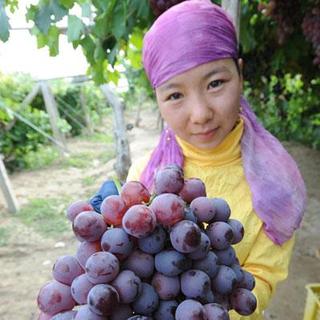
介绍:
Known as the home of singing and dancing, the land of fruits, and the place of gold and jade stones, Xinjiang Uygur Autonomous Region in northwest China boasts a vast expanse, beautiful landscape and unique folk customs.
Xinjiang is a place that features on many people's travel wish list.
So on today's program, let's take a trip to Xinjiang. We will sample the local food and music, and meet some wonderful people in the charming land. Stay with us.
------
Some of China's best wines are from Xinjiang. The very best ones are from Turpan, in the Taklimakan Desert, where the temperatures regularly hit 50 degrees in the summer and -20 in winter. Under such an extreme climate, one local plant in particular is highly valuable, namely, the vine. The vine obviously grows grapes, and of course where people grow grapes �C they inevitably turn to making wine. Xinjiang wines therefore have a long, noble and romantic history.
China's thirst for wine has grown in recent years. Over 270 million liters were imported into the country in 2012, over 10% more than the year before.
So do wine producers in Xinjiang have what it takes to compete in this lucrative market?
Dominic Swire visits one vineyard in Xinjiang to find out.
------------
The Tianshan Mountain divides the northern and southern part of Xinjiang, with the two areas characterized by very different climates and landscapes. Southern Xinjiang is believed to be relatively poor compared to the north, where the Karamay Oilfields and fertile Ili River valley are situated.
Over the past few decades, China has invested heavily to reduce poverty in southern Xinjiang. Of all the sectors demanding more resources, education has been a top priority.
Rpt:
13 year old Merhaba is from the Kashgar region in southern Xinjiang. She is now studying in No.66 Middle School in Urumqi, the capital city of Xinjiang.
The 8th grader is among some 15,000 ethnic minority students from underdeveloped areas who are receiving free education in the region's developed cities.
"After graduating from junior high school, I hoped that I could go to a big city outside Xinjiang for further education. After that, I will return to my hometown of Kashgar. Kashgar has many great tourist sites. We have the best fruits in the world. I hope more people will know about Kashgar and how great our fruits are. "
Merhaba says that back in her hometown, educational resources are scarce and drop-out rates are high. But here in Urumqi, students have better teachers, textbooks, and better learning facilities.
Merhaba say the enthusiasm for these classes is high and competition is fierce. She was enrolled into the No. 66 Middle School in Urumqi a year ago after excelling at the fierce entrance examination. Cherishing the opportunity of studying in such an advanced school, Nerhaba quickly got over her homesickness:
"I didn't know anyone when I first came. I felt lonely and homesick. It was very unlike home here and the weather was also different. Everything was different. But my teachers and classmates helped me a lot and I got used to the new environment pretty fast. Teachers help us with daily matters, and they teach us about everything. We have many interesting in-class and extracurricular activities and it is easy to adapt to my new life."
Merhaba is now the leader of the Campus TV in Urumqi No. 66 Middle School. Filming her classmates' daily life and some important campus activities has become a big part of her life and she is happy about that. Merhaba's elder brother is a graduate of the school and went to Shanghai to receive senior high school education. Merhaba is very proud of her brother.
"I want to go to Shanghai. My brother is in Shanghai now and he often sends us pictures. It looks so developed. I really want to go there and see the beautiful city myself."
Teachers at the school say that at least half of their graduates will go to high schools in cities like Beijing, Shanghai and Guangzhou.
A teacher surnamed Zhang says that though far away, graduates still keep in touch with their alma mater:
"I am glad that these children come back often to visit us during their vacations. There is a strong bond between them and the school. Some often send us postcards from the cities where they now reside, and send us short messages to tell us about their lives: not only in terms of how great they are doing but also the problems they are encountering. Sometimes they write to us about how they miss the old days at school. It is quite touching. Most of them will be back to Xinjiang after college, by which time they'll be pillars of the local community."
For 13 year old Merhaba, she doesn't have much time to look into the distant future. But she knows 'no pain, no gain". The native Uyghur speaker has learned to talk in fluent mandarin, and now, together with her class, she's struggling to master another language, English.
Meng Lang is the principal of No. 66 Middle School in Urumqi. He says multilingual education helps to bridge communication divides and facilitate understanding between people of different ethnic groups in Xinjiang, where 60 percent come from ethnic minorities, including Uygur, Kazak, Russian and Mongolian groups.
"It is very necessary for the children to know more than one language. If they can write and speak in their own ethnic tongue, Mandarin and English at the same time, that will help them better integrate with the outside world."
The principle says schools like the one he serves have mushroomed in Xinjiang. In Urumqi alone, there are already four, with ten thousand students graduating each year. Teachers here are dedicated, not only to teaching, but also to the breakdown of ethnic barriers.
大家还在听

